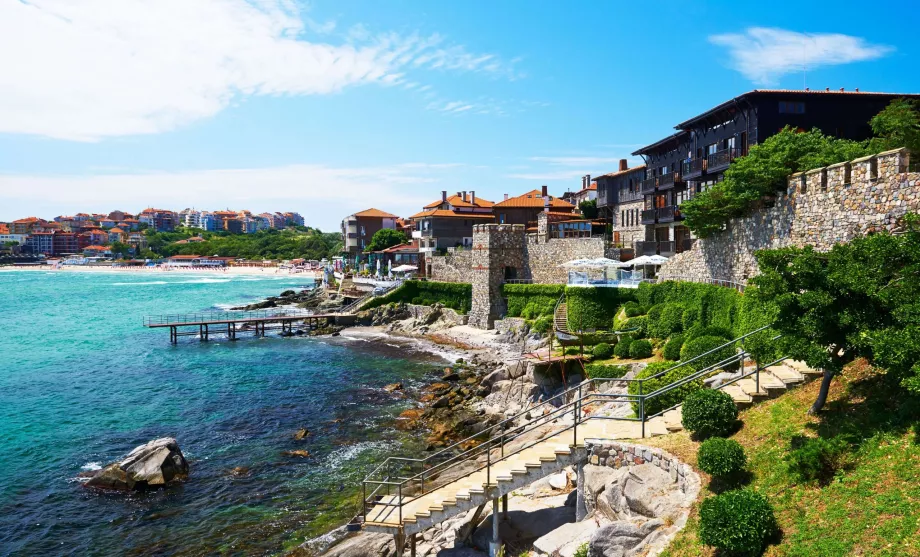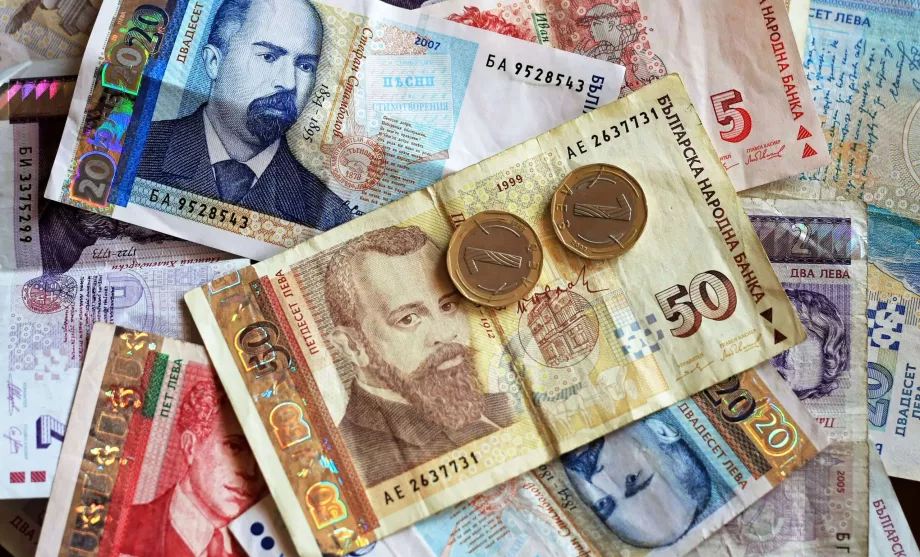What currency do you pay with in Bulgaria? How much do goods cost in a regular supermarket and how much in a restaurant? And how much does a week's stay cost? Find out in this chapter.
Find out the prices of hotels in Bulgaria
Bulgarian lev (BGN)
The local currency is the Bulgarian lev, sometimes incorrectly written as Bulgarian leva or levo.
The Bulgarian lev is then divided into 100 hundredths.
Coins are minted in the form of 1, 2, 5, 10, 20, 50 stotinki and 1 lev. Banknotes are then printed in denominations of 1, 2, 5, 10, 20, 50 and 100 leva.
- International currency code: BGN, formerly BGL (numerical code 975)
- Currency symbol: лв. or lv.
The Bulgarian lev is pegged to the euro at a fixed exchange rate that never changes.
- 1 € = 1.955583 lv.
Can I pay with the euro in Bulgaria?
Some shops in tourist centres or travel agencies offering tours do accept payments in euros, but often at an unfavourable exchange rate.
In general, payment in euros is not common in Bulgaria and is not preferred by merchants.
So always exchange or withdraw Bulgarian leva from an ATM.
Exchange offices and where to exchange money to Bulgaria
There are a large number of currency exchange offices in Bulgaria, and not only in the tourist resorts.
Usually one company has a monopoly in any given town and all branches have the same exchange rate.
The rates are not bad, but some branches are not always fair. They list different rates on the board outside the exchange office than they do hanging right next to the exchange window. By the time they change your money, it's too late.
It is always best to buy Bulgarian leva for euros, as these currencies are pegged at a fixed rate.
Payment by card and ATMs
From our point of view, the optimal option is to withdraw from ATMs, unless your bank applies high withdrawal fees abroad. ATM withdrawal fees may be charged by the Bulgarian bank itself, but they are usually the same or lower than the fees at exchange offices, and you are not exposed to any risk of fraud.
Bulgarian ATMs that do not charge a withdrawal fee:
- Postbank (Eurobank Bulgaria)
- CCB
ATMs such as OTP, Euronet or ING Bank charge a high fee around 5 bgn.
ATMs are easy to find in all major cities and seaside resorts.
Card payments are much less widespread in Bulgaria than elsewhere in Europe.
You can easily pay by card in all supermarkets, hotels, petrol stations or shops selling expensive goods (electronics, clothes, etc.).
On the other hand, you can almost never pay by card in transport, restaurants (except fast-food outlets), monuments or attractions.
You simply cannot do without cash in Bulgaria.
Tipping and haggling
In some expensive restaurants, a tip of usually 10% is already included in the price.
Generally, however, this is not the rule and tips are left in addition to the total bill at around 10%. The tip is left on the table when you leave; putting it directly in your hand is socially unacceptable.
Bargaining in Bulgaria is not very traditional and we do not recommend trying it even in the markets.
How much does what cost - prices in Bulgaria
Bulgaria is one of the weakest countries in the EU economically. In general, therefore, Bulgaria is cheaper than countries in Western Europe, but the differences are quickly blurring.
Public transport is very cheap in Bulgaria, hotels and car rentals are also cheap. Prices in shops and restaurants are at a comparable level to those in Western Europe.
Inland it is about twice as cheap as in the seaside resorts.
For hotels by the sea, it is always a good idea to book well in advance (at least 2-3 months).
Book a hotel in Bulgaria in advance
Example of prices
How much does basic food, tourist attractions or transport cost in Bulgaria? Take a look at the indicative price table.
Accommodation in a double room (prices per night)
- Cheap hotel with shared bathroom - from 22 eur
- 3* hotel in inland - from 37 eur
- 3* hotel by the beach - from 48 eur (off-season from 37 eur)
- Hotel with half board by the beach - from 92 eur
- Accommodation offers in Bulgaria
Food in the restaurant
- Hot main meal in the beach restaurant - 20 bgn
- Hot main meal in a restaurant in the inland - 15 bgn
- Three-course menu for 2 in a better restaurant in the city centre - 40 bgn
- Menu in a fast-food restaurant - 15 bgn
- Espresso or Cappuccino - 3,20 bgn
- Water 0.33 l - 1,50 bgn
- Draft beer - 3,50 bgn
Food in a supermarket
- Water 1.5l - 1,20 bgn
- Coca Cola (and other sodas) 2l - 2,50 bgn
- Milk 1l - 3 bgn
- Ice cream scoop - 3 bgn
- Canned fish - 4,50 bgn
- Apples - 2,60 bgn / kg
- Bananas - 3,30 bgn / kg
- Oranges - 2,60 bgn / kg
- Eggs 6 pcs - 3 bgn
- Pasta 500 g - 3,50 bgn
- Chicken 500 g - 7,50 bgn
Transport
- Price of petrol - prices vary considerably over time, but are cheaper than in neighbouring countries
- Long-distance bus or train ticket - 30 bgn to 35 bgn (between Sofia and Burgas/Varna)
- Suburban bus - approx. 8 bgn / 1 hour ride
- Public transport, one way - 1,60 bgn to 2 bgn
- Taxi - 2,50 bgn boarding rate + 2,50 bgn rate per km
Beaches
- Sunbed and umbrella rental for 1 day - approx. 30 bgn (2 sunbeds + 1 umbrella)
- Minigolf - 10 bgn
- Pedal boat rental - 20 bgn per hour
- Motorboat rental - 100 bgn per hour
- Parasailing - 150 bgn
- Water banana ride - 30 bgn
- Jet Skiing - 150 bgn
- Toilet on the beach: 1 bgn
Cigarettes and alcohol
- Pack of cigarettes - 6 bgn
- Beer 0.5 l - 1,80 bgn
- Bottle of good wine - 11 bgn
- Cocktail in the beach bar - 10 bgn
Daily budget - How much money to take with you
How much money to bring to Bulgaria is mainly a question of the type of stay.
If you are going with a tour operator and have most things arranged and paid for in advance, then you won't need more than 300 bgn per person for a week in case you want to go out for a drink in the evening, buy some souvenirs, eat at beach restaurants over lunch and occasionally take advantage of an attraction.
If you are travelling on your own, you will surely find yourself in one of the categories below:
The low-budget traveler takes public transport, bus or minibus. They usually stay in an apartment with a kitchenette. The cheapest way to get food is at local small shops, supermarkets or markets.
Find the cheapest accommodation in Bulgaria
A common traveller is staying in an apartment with breakfast. For lunches, you can go to cheaper restaurants or eat at buffets. You travel by public transport, but rent a car for a few days and go on a trip.
If you're more discerning, stay in a 4* or 5* with at least breakfast. You deal with transport by taxi or hire car throughout your stay and try a different attraction on the beach each day.
The following table shows prices for a week's stay in high season for 2 people. The cost is based on a per day basis for 1 person.
| Accommodation | Food | Public transport | Car rental | Attractions | Total price | |
|---|---|---|---|---|---|---|
| Low-cost | 0 eur 18 eur | 0 eur 0 eur | 0 eur 0 eur | 0 eur | 0 eur 0 eur | 0 eur 7 eur |
| Regular traveller | 0 eur 22 eur | 0 eur 0 eur | 0 eur 0 eur | 0 eur 0 eur | 0 eur 0 eur | 0 eur 22 eur |
| Expensive option | 0 eur 18 eur | 0 eur 0 eur | 0 eur | 0 eur 0 eur | 0 eur 0 eur | 0 eur 0 eur |



